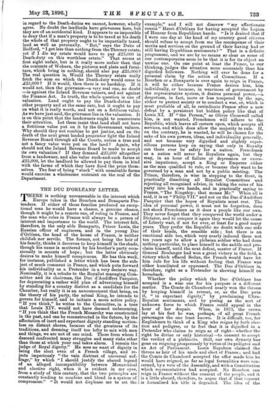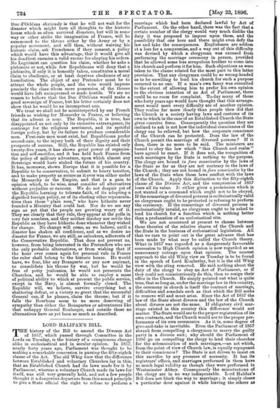THE DUO D'ORISANS' LETTER. T HERE is nothing unreasonable in the
interest which Europe takes in the Bourbon and Bonaparte Pre- tenders. If either of those families produced an excep- tional man he would have a chance, a genuine chance, though it might be a remote one, of ruling in France, and the man who rules in France will always be a person of interest and importance to the world. The interest felt, therefore, in the only able Bonaparte, Prince Louis, the Russian officer of engineers, and in the young Due d'Orleans, the head of the house of France, is neither childish nor servile. The former, not being the heir of his family, thinks it decorous to keep himself in the shade, though his name is muttered by his brother's party occa- sionally in accents of hope ; but the latter obviously desires to make himself conspicuous. He has this week, for instance, published a letter which has been the sub- ject of much comment in France, and which puts forward his individuality as a Pretender in a very decisive way. Nominally, it is a rebuke to the Royalist managing Com- mittee and its chairman, the Due d'Audiffret Pasquier, for deprecating a rather wild plan of advertising himself by standing for a country district as a candidate for the Chamber, but really it is an announcement that being, on the theory of his party, the actual King, he intends to govern for himself, and to initiate a more active policy. "If you think," he writes to the Committee, in a tone that Louis XIV. would not have deemed unbecoming, "If you think that the French Monarchy was constructed in the past, and can be reconstructed in the future, by the affectation of inert and expectant dignity standing motion- less on distant shores, because of the greatness of its traditions, and deeming itself too lofty to mix with men and things, we are not of one mind. Those from whom I descend confronted many struggles and many risks other than those at which your zeal takes alarm. I remain the judge of Royal dignity." He sees no want of dignity in being the elect even of a French village, and re- jects imperiously "the vain distrust of universal suf- frage," by which "I should justify the absurd legend of an alleged incompatibility between Monarchical and elective right, when it is evident in my eyes, from a study of this century, that the two principles are constantly tending to combine and blend in a system of compromise." "It would not displease me to set the example," and I will not disavow "my affectionate cousin" Henri d'Orhlans for having accepted the Legion. of Honour from Republican hands. "Is it desired that if I were one day at the head of my country good citizens. should refuse to accept from me the recompense of their merits and services on the ground of their having had or still having Republican sentiments P " That is a definite programme, and we are by no means so clear as some of our contemporaries seem to be that it is for its object an unwise one. On one point at least the Prince, to our thinking, judges the situation more accurately than his dignified followers. Nothing will ever be done for a personal claim by the action of Committees. If a Bourbon or a Bonaparte is ever again to reign in France,. it will be either because France desires him, him individually, or because, in weariness of government by the representative system, it desires personal power,—a. despotism, in fact, more or less tempered by the age, either to protect society or to conduct a war, or, which is. most probable of all, to revindicate France after a new defeat by a persistent but hidden policy like that of Louis XI. If "the Person," as Oliver Cromwell called him, is not wanted, Frenchmen will adhere to the. Republic, which leaves all careers open, which accepts all services, and which does allow the majority to rule. If, on the contrary, he is wanted, he will be chosen for the sake of his own powers, ideas, and individuality generally,. and not because very dignified and slightly super- cilious persons keep on saying that only in Royalty can there ever be safety for a nation. Frenchmen. as a. nation will never be Royalists again, but they may, in an hour of failure or depression or exces- sive impatience, accept a King or Emperor either as the man qualified to rule, or because they want to be governed by a man and not by a public meeting. The Prince, therefore, is wise in stepping to the front, in practically dissolving all Royalist Committees and rejecting all recognised advice, in taking the reins of hi& party into his own hands, and in practically saying te France, "The Kingship ; that means Me." When all is said, it is on "Philip VII." and not on the Due d'Audiffret Pasquier that the hopes of Royalists must rest. The idea of personal power, it must not be forgotten, does. not shock Frenchmen as it does a people like our own. They never forget that they conquered the world under a Dictator, and to conquer it again they would let the cause of Liberty wait, if not for ever, at least for a good many years. They prefer the Republic no doubt with one side of their heads, the sensible side ; but there is an emotional side too, which very nearly induced them not ten years ago to allow a plebeian soldier who had done nothing particular, to place himself in the saddle and pro- claim himself, until the next defeat, master of France. If General Boulanger had won a great victory in the field, & victory which effaced Sedan, the French would have let him rule for his life without feeling that France was either humiliated or oppressed. The Due d'OrMa,ns is, therefore, right as a Pretender in showing himself on horseback.
Whether the policy which the Due d'Orleans has accepted is a wise one for his purpose is a different. matter. The Comte de Chambord nearly won the throne by keeping himself in retreat, or, as the Due puts. it, " in expectant dignity," by proclaiming Ultra- Royalist sentiments, and by posing as the sort of unknown force to which France could appeal in the hour of her despair. When, in 1873, the crown lay at his feet he was, perhaps, of all great French personages the one least known. It is difficult, too, for Englishmen to think of a King who reigns by both elec- tion and pedigree, or to feel that it is dignified in a. Pretender who claims to reign as of right—whether the right be divine or only historical—to consent to accept the verdict of a plebiscite. Still, our own dynasty has gone on reigning prosperously by virtue of its pedigree and an Act of Parliament. Louis Napoleon claimed the throne as heir of his uncle and elect of France ; and had the Comte de Chambord accepted the offer made him he would have reigned, as far as legal formalities were con- cerned, by a vote of the Assembly, and with a Constitution which representatives had accepted. No Bourbon can reign in France without the consent of the people, and it is a little absurd, therefore, to argue that if that consent is formalised his title is degraded. The idea of the Due d'Orl4ans obviously is that he will not wait for the disaster which might turn all thoughts to the historic house which so often survived disasters, but will in some way or other strike the imagination of France, will be summoned to the throne either by the Army or by a popular movement, and will then, without waiving his historic claim, ask Frenchmen if they consent, a policy which would have this advantage, that it would give all his deadliest enemies a valid excuse for obeying his orders. No Legitimist can question his claim, whether be asks a plebiscite or not, while few Republicans will deny that a plebiscite, if only it is honestly taken, constitutes a moral claim to obedience, or at least deprives obedience of any humiliation. The object of any Pretender must be to attract the whole people, and the vote would impress precisely the class whom mere possession of the throne would have left unimpressed or made hostile. We see no reason to believe that the Due d'Orl6ans would make a good sovereign of France, but his letter certainly does not show that he would be an incompetent one.
We trust we shall not be misinterpreted by our French friends as wishing for Monarchy in France, or believing that its advent is near. The Republic, it is true, has disappointed us not only by its excessive extravagance, its contempt for the religious sentiment, and its spiteful foreign policy, but by its failure to produce considerable men. First-rate men must exist, but Republicans prefer second-rate, to the injury both of their dignity and their prospects of success. Still, the Republic has existed only twenty-five years, it has shown great power of organisa- tion and self-sacrifice, and it has held back France from the policy of military adventure, upon which almost any Sovereign would have staked the future of his country. It has, moreover, shown Europe that it is possible for a Republic to be conservative, to submit to heavy taxation, and to make property as secure as it ever was either under the Monarchy or the Empire, and that is a gain to opinion which, to be wise, must consider all alternatives without prejudice or rancour. We do not despair yet of the Republic learning to tolerate faith, of its adopting a dignified foreign policy, or of its electing other representa- tives than those "plain men," who have hitherto never founded a Ministry that could last. Nor do we see any sign as yet that the people are growing weary of it. They see clearly that they rule, they appear at the polls in very fair numbers, and they neither disobey nor revile the Republic as they have hitherto done whenever they wished for change. No change will come, as we believe, until a disaster has shaken all confidence, and as we desire no disaster for France, we are still, as onlookers, adherents of the Conservative Republic. That does not prevent us, however, from being interested in the Pretenders who are the only probable alternatives, or from wishing that if the hour ever comes again for personal rule in France the ruler shall belong to the historic house. He would have, we fear, like any Bonaparte or any new aspirant, to consolidate his throne by war, but he would be free of petty jealousies, he would not persecute the Churches, and he would be able to employ a mass of political ability to which at present the public service, except in the Navy, is almost formally closed. The Republic will, we believe, survive everything but a shattering defeat, or a victory so great that the successful General can, if he pleases, claim the throne ; but if it falls the Bourbons seem to us more deserving of sympathy than either the Bonapartes or adventurers like that unhappy General Boulanger, and outside these no alternatives have as yet been so much as described.



































 Previous page
Previous page